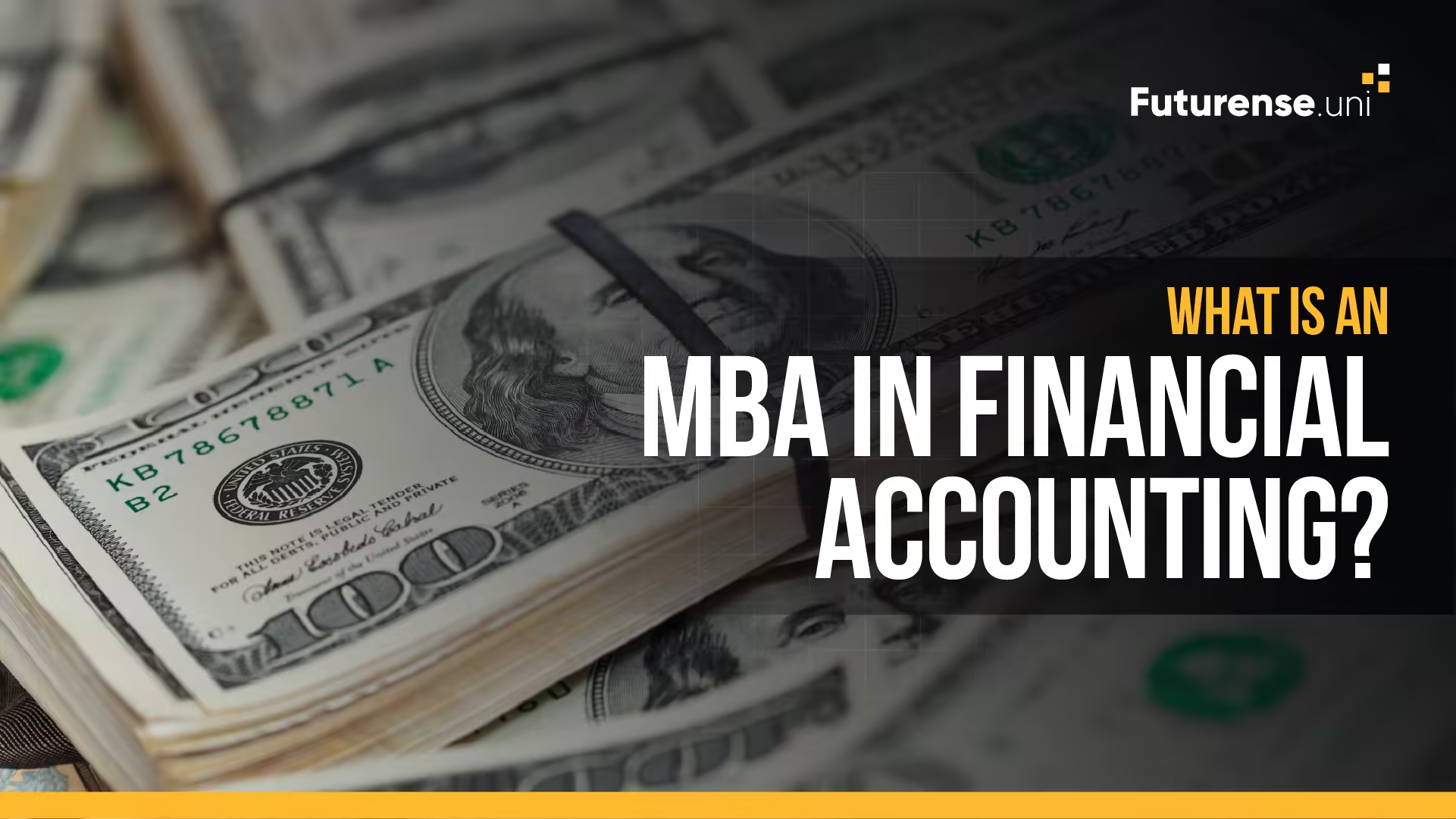The need for professionals who can manage and interpret financial data in today’s data-driven world is increasing exponentially in the business world. An MBA in financial accounting can fulfil this demand as this specialised programme trains professionals with the skills and knowledge required for various finance-focused roles across industries.
If you are considering pursuing an MBA as your postgraduate course, this article is for you. From understanding what an mba in finance is, to the expected salary once you graduate, to the prospects you have; everything and more is covered here.
What is an MBA in Financial Accounting?
Financial Accounting MBA is a postgraduate course. The focus of the degree is on accounting principles, financial management and decision-making. The course teaches both core business management subjects like marketing, and strategy and others with specialised accounting subjects like financial analysis, corporate taxation and auditing.
The programme is perfect for those who aspire to work as a Financial Analyst, Chief Financial Officer CFO, or Financial Consultant. This MBA course perfectly blends theoretical accounting knowledge with practical application in real-world business scenarios.
Key Components of the Programme
If you are planning to study this MBA, here are the subjects you will have to study.
Core Subjects
- Financial Accounting and Reporting
- Managerial Accounting
- Corporate Finance
- Financial Risk Management
- Taxation and Auditing
- International Financial Reporting Standards (IFRS)
Managerial and Strategic Focus
- Strategic Cost Management
- Business Analytics
- Leadership and Ethics in Finance
- Financial Decision-Making
Practical Exposure
- Case Studies: Real-world scenarios help students understand the complexities of financial management.
- Internships: Hands-on training in multinational companies, startups, or Indian conglomerates.
- Industry Projects: Collaboration with industry experts to solve contemporary financial problems.
Soft Skills Development
- Communication skills for presenting financial data effectively.
- Leadership skills for managing teams in financial departments.
- Analytical thinking for decision-making.
Why Pursue an MBA in Financial Accounting?
If you are wondering if this is the right postgraduate course for you or not, then here are the reasons for pursuing an MBA in accounting and finance.
1. High Demand for Financial Professionals
India's growing economy and the globalized business environment have spurred a massive demand for financial professionals. This has led to a massive demand for financial professionals who can interpret financial data, ensure regulatory compliance and make strategic decisions. Who is better than an MBA graduate to fulfill this role?
2. Career Versatility
The degree is not just for corporate employment; as graduates, you can also opt for consultancy and entrepreneurship. Moreover, if you want to pursue employment, you can work in all kinds of industries, be it banking, manufacturing, IT, or FMCG.
3. Enhanced Earning Potential
As a professional, MBA graduates tend to earn more than others. Even among MBA graduates, MBA in financial accounting graduates have higher earning potential as their degree is a very specialized one and comes with leadership training. Even in entry-level positions like that of Financial Analyst, you can get attractive packages and have good growth potential.
4. Networking Opportunities
Depending on where you are studying for your MBA, you can have a strong professional network among your peers, alumni, faculty and others. All these will help you build a successful career in finance.
Eligibility Criteria For Studying Financial Accounting MBA
Most Indian universities and B-schools have the following eligibility requirements:
1. Educational Qualification
- Must have passed any undergraduate program with a minimum of 50% marks.
- Commerce or business graduates often have an edge, but graduates from other streams are equally eligible.
2. Entrance Exams
- Common Admission Test (CAT)
- Management Aptitude Test (MAT)
- Xavier Aptitude Test (XAT)
- Graduate Management Admission Test (GMAT)
3. Work Experience
- While not mandatory, prior work experience in accounting or finance is considered an added advantage.
4. Personal Interviews and GDs
- Candidates are usually assessed through personal interviews and group discussions to gauge their aptitude and communication skills.
Top Institutes Offering MBA in Financial Accounting in India
Some of the premier institutes offering this programme include:
1. Indian Institutes of Management (IIMs)
Known for world-class faculty and industry connections, IIMs offer specialisations in finance and accounting.
2. XLRI Jamshedpur
A leader in business education with a strong emphasis on financial management.
3. Faculty of Management Studies (FMS), Delhi
Offers a cost-effective yet comprehensive MBA programme with finance specialisation.
4. SP Jain Institute of Management and Research (SPJIMR), Mumbai
Renowned for its focus on global business practices and financial accounting.
5. Symbiosis Institute of Business Management (SIBM), Pune
Provides an industry-oriented curriculum tailored for financial roles.
There are also institutes offering MBA finance online courses tailored for working executives. If you are a working professional in the financial sector and want to improve your skill set, then you can go for our Futurense Uni program. Under this program, you complete your MBA at IIT Jodhpur School of Management And Entrepreneurship. There is no GATE or CAT requirement, and you get to be part of IIT Alumni! This course is specially designed for those looking to work in the digital economy and e-commerce companies as it has the perfect balance between business and corporate strategy along with a focus on Data Analysis, AI and Digital Finance.
Career Opportunities Post MBA in Financial Accounting
An MBA in Financial Accounting can lead to a wide range of career opportunities. Here are some popular roles:
Financial Analystsome text
Analysing financial data to help companies make informed business decisions.
Chief Financial Officer (CFO)some text
Overseeing the financial strategy and management of an organisation.
Investment Bankersome text
Helping companies to raise capital and also guiding them during mergers and acquisitions.
Auditorsome text
Checking all financial records to make sure they are correct and compliance with regulations.
Tax Consultant some text
Providing consultations on tax planning and compliance to individuals as well as companies.
Entrepreneur some text
Leveraging financial expertise to manage startups or family businesses.
Salary Expectations in India
The salary for MBA graduates in Financial Accounting varies based on the industry and role. Here’s a general overview:
- Entry-Level Roles: ₹6-12 lakhs per annum
- Mid-Level Roles: ₹12-25 lakhs per annum
- Senior-Level Roles: ₹25-50 lakhs or more per annum
Top recruiters include multinational corporations like Deloitte, PwC, EY, KPMG, HDFC Bank, ICICI Bank, and startups in the fintech sector.
Future Prospects
Digital Finance is the future of financial accounting, and this MBA prepares professionals for this integration of technology and finance. For instance, our MBA Tech programme focuses on subjects like FinTech, blockchain, and AI-driven financial analysis. If you choose an MBA course that includes such subjects, you will be more than ready for the future and your demand in the job market will only increase.
Conclusion
An MBA in financial accounting is a gateway to a fulfilling career in finance, offering the perfect blend of theoretical knowledge and practical skills. For Indian students aiming to thrive in today’s dynamic economic landscape, this degree not only ensures career advancement but also positions them as strategic leaders in the financial world.
Whether you aim to work in a multinational corporation, establish your own business, or consult for organization, a Financial Accounting MBA is a worthwhile investment in a future filled with opportunities.
FAQ: MBA in Financial Accounting
What is an MBA in Financial Accounting?
An MBA in Financial Accounting is a specialized postgraduate program combining core MBA coursework with deeper training in accounting, auditing, financial reporting, taxation, and corporate finance.
What are the eligibility criteria for an MBA in Financial Accounting?
Typically, you need a bachelor’s degree (in any discipline — business, commerce, or others), sometimes relevant work experience (1–3 years), and entrance exam scores (GMAT, CAT, or equivalent depending on the country/institution).
What subjects are covered in MBA Financial Accounting?
You’ll study topics such as management accounting, advanced financial accounting, taxation, auditing, financial statement analysis, corporate finance, accounting information systems, and ethics.
What career opportunities are there after an MBA in Financial Accounting?
Graduates can work as financial controllers, accounting managers, auditors, chief financial officers (CFO), finance consultants, tax advisors, or roles in corporate finance and financial analysis.
How much does an MBA in Financial Accounting cost?
Tuition fees depend on the institution and country. In many cases, specialized MBA programs incur higher fees compared to general MBAs. Also, factor in costs like materials, living expenses, and exam fees.
Is MBA in Financial Accounting suitable for non-accounting backgrounds?
Yes. Many programs welcome students from diverse backgrounds. However, you may need to catch up with foundational accounting and finance concepts through bridging or foundational courses.










